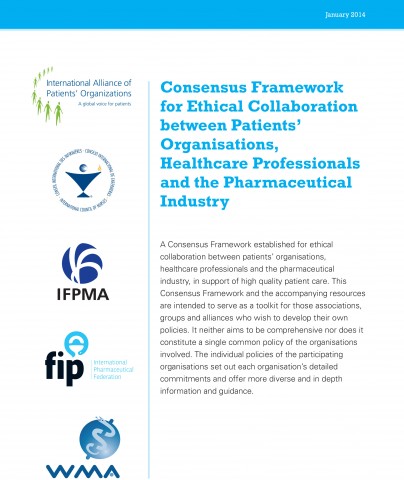Business Ethics for APEC SMEs Initiative
The World's Largest Public-Private Partnership to Strengthen Ethical Business Practices in the Biopharmaceutical Sector
The IFPMA Code of Conduct serves as the main reference for the APEC Mexico City Principles, the only best practice guidance for the industry welcomed by Leaders (Heads of State) and Ministers.
Since 2018, IFPMA has served as Industry Co-Chair of the APEC Biopharmaceutical Working Group on Ethics.
The Business Ethics for APEC SMEs Initiative launched the biopharmaceutical sector programme in September 2011, with the aim of disseminating high-standard ethical business practices across 21 leading Asia-Pacific economies across four continents.
An Expert Working Group was convened in Mexico City where senior government, academic and industry leaders convened to craft the “APEC Principles for Voluntary Codes of Business Ethics in the Biopharmaceutical Sector” (The Mexico City Principles). The inspiration and key reference point for the content of the Mexico City Principles came from the IFPMA Code of Practice.
Since 2014, hundreds of biopharmaceutical and health sector stakeholders committed to heightening collaboration on ethical business conduct through Consensus Frameworks. Ultimately, the IFPMA Consensus Framework was used as the basis for the APEC Guide to Facilitate Multi-Stakeholder Ethical Collaborations, which has now helped provide the impetus for the development of nine Consensus Framework Agreements across the region.
In 2018, IFPMA was chosen as the Industry Co-Chair of the APEC Biopharmaceutical Working Group on Ethics and has held this position since.
Mission:
Facilitate a level playing field for all biopharmaceutical enterprises while supporting small and medium-sized enterprises, reduce reputational and legal risk for the sector, and build trust through ethics among key stakeholders across economies’ health systems.
Activities:
Identify and propagate best practices, build capacity to implement ethical practices for industry associations and small and medium-sized enterprises, foster multi-stakeholder consensus and collaboration, and monitor/evaluate change in ethical business conduct for the sector across the region.
APEC SME Leaders in Ethics and Integrity Program (LEIP)
To support the development and success of small and medium enterprises (SMEs), the Initiative has designed the APEC SME Leaders in Ethics and Integrity Program (LEIP) to help biopharmaceutical industry associations equip leaders of their SME members with resources and a valued network to reinforce a culture of integrity within their enterprise. Using a “tone-at-the-top” approach, the mission of LEIP is to support the integration of the APEC Mexico City Principles into the daily business practices of every SME that develops, manufactures, markets, or distributes any pharmaceutical and/or biologic product. This year the Initiative is launching pilots of the LEIP in the United States and China to then be rolled out in additional economies.
Impact:
- APEC Mexico City Principles, recognized by APEC Economic Leaders and Ministers
- A network of nearly 2,000 stakeholders spanning all 21 APEC economies and dozens of economies outside the APEC region
- More than doubled the number of industry association codes, expanding best practices to nearly 10,000 biopharmaceutical enterprises
- Nine consensus framework agreements bringing together more than 200 peak health care organizations for patients, governments, industry, health care professionals, providers, and civil society: Australia, Canada, Chile, China, Japan, Mexico, Peru, the Philippines, and Viet Nam.
The Asia-Pacific Economic Cooperation forum (APEC) is the leading economic forum in the Asia-Pacific and Americas. APEC’s aim is to create greater prosperity for the people of the region by promoting balanced, inclusive, sustainable, innovative, and secure growth and by accelerating economic integration.
APEC is an inter-governmental body of 21 member “economies” that represent a majority of global GDP and trade.
APEC convenes at the Head of State (Leaders) level and includes over 40 year-round working bodies – welcoming to the private sector and civil society – that allow members to collectively respond to new challenges to the region, including preparing for pandemics, disaster resilience and addressing terrorism.
56
industry association codes from all 21 APEC economies
9800+
enterprises using industry association codes
9
consensus framework agreements














